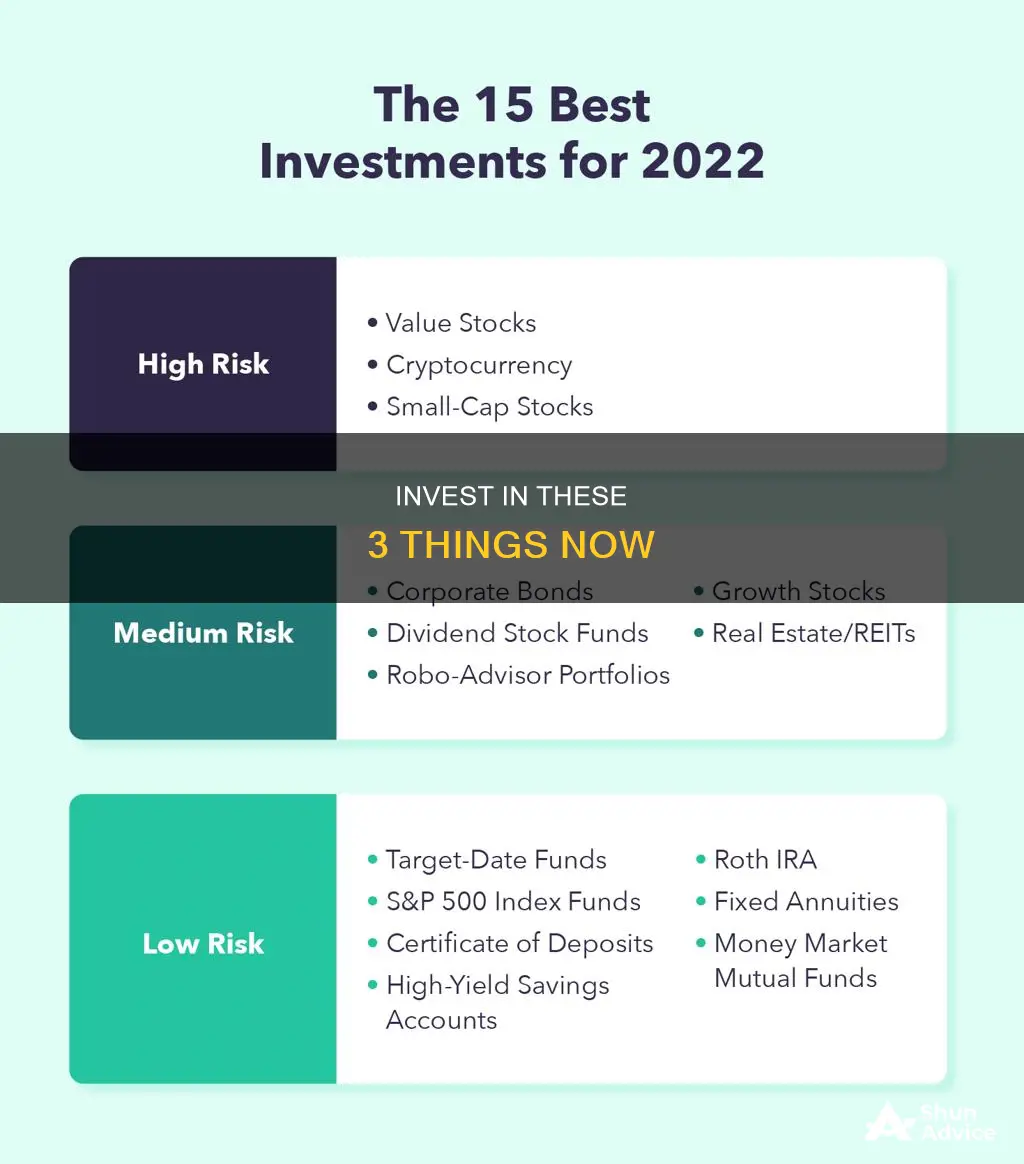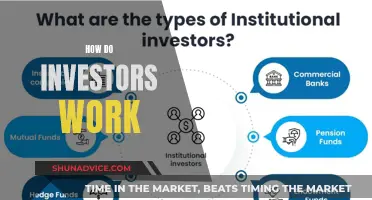
There are many options for what to invest in right now, and the best choice depends on your financial goals, risk tolerance, and time horizon. Here are some of the most common investment options:
- Stocks: Stocks are a way to own a part of a business, and they have consistently proven to be a great way to build wealth over the long term. You can invest in individual stocks or stock-based investments like exchange-traded funds (ETFs) and mutual funds.
- Bonds: Bonds are loans to a company or government and are considered a safer investment option, although they may not provide as high of a return as stocks. There are different types of bonds, including corporate bonds, municipal bonds, and treasury notes.
- Real estate: Investing in real estate can be a great way to build wealth, either through buying rental properties or through real estate investment trusts (REITs). REITs are traded on stock market exchanges and offer high dividend yields.
- High-yield savings accounts and certificates of deposit (CDs): These are low-risk investment options that offer higher interest rates than traditional savings accounts. CDs offer a fixed interest rate for a defined period, while savings accounts provide more flexibility in accessing your money.
- Cryptocurrencies: Cryptocurrencies like Bitcoin and Ethereum are a relatively new form of investment that can be incorporated into a diversified portfolio if you have knowledge of the market.
- Mutual funds and index funds: Mutual funds and index funds are types of investment funds that pool investor money to purchase a collection of securities. Index funds aim to replicate the performance of a specific stock market index, while mutual funds may have more specific investment goals.
- Robo-advisors: Robo-advisors are automated investment platforms that can help you create and manage a diversified portfolio based on your financial goals and risk tolerance.
| Characteristics | Values |
|---|---|
| Investment Type | High-yield savings accounts, Long-term certificates of deposit, Long-term corporate bond funds, Dividend stock funds, Value stock funds, Small-cap stock funds, Rental housing, S&P 500 index funds, Nasdaq-100 index funds, Exchange-traded funds, Mutual funds, Index funds, Stocks, Dividend stocks, Bonds, Money market mutual funds, Real estate investment trusts, Alternative assets |
| Risk Level | Low, Medium, High |
| Time Horizon | Short-term, Medium-term, Long-term |
| Investor Knowledge | Basic, Advanced |
| Investment Amount | Small, Large |
What You'll Learn

High-yield savings accounts
When choosing a high-yield savings account, it's important to consider the interest rate, deposit and balance requirements, fees, and compounding frequency. It's also worth noting that, while high-yield savings accounts are generally safe—as long as your funds are insured by the Federal Deposit Insurance Corp (FDIC) or National Credit Union Administration (NCUA)—there is a chance that you could lose some of the value of your savings if interest rates don't keep up with inflation.
- UFB Direct High Yield Savings: This account offers an excellent APY of 5.25% and has no monthly fee, minimum balance requirements, or physical branches.
- Laurel Road High Yield Savings: With a competitive APY of 5.15%, no monthly fees, and no balance requirements, this account is a solid option if you want a high APY and easy access to your funds.
- Varo Savings Account: This account offers an APY of 3.00%, which increases to 5.00% if you meet certain requirements, such as receiving direct deposits of at least $1,000 per month. Varo also offers multiple automated savings tools to help you save more efficiently.
- LendingClub Bank High-Yield Savings: LendingClub's High-Yield Savings account offers a strong APY of 5.00% and no monthly fees. You only need $100 to open an account, and there's no minimum required balance after that.
- Bask Bank Interest Savings Account: With an APY of 5.10% and no monthly fees, minimum deposit requirements, or balance requirements, this account is a great option if you prefer digital banking and don't need a checking account or ATM access.
Safemoon Investors: Who's In?
You may want to see also

Long-term certificates of deposit
CDs are a good option when you expect rates to fall, allowing you to keep your money earning higher rates for years. The financial institution pays you interest at regular intervals, and once the CD matures, you get your original principal back plus any accrued interest.
CDs do carry reinvestment risk, which means that when interest rates fall, investors will earn less when they reinvest principal and interest in new CDs with lower rates. The opposite risk is that rates will rise and investors won't be able to take advantage because they've already locked their money into a CD. With rates expected to fall in 2024, it may make sense to lock in your money with long-term CDs so that you can earn a higher return for the life of the CD.
When choosing a CD, consider the APY, compounding schedule, minimum deposit, term, early withdrawal penalty, and whether the CD automatically rolls over to another term at maturity. Bankrate's list of best CD rates will help you find the best rate across the nation.
Altcoin Investment: Best Picks
You may want to see also

Long-term corporate bond funds
Some examples of long-term corporate bond funds include:
- SPDR® Portfolio Long Term Corp Bd ETF
- IShares 10+ Year Invmt Grd Corp Bd ETF
- Vanguard Long-Term Corporate Bd ETF
- IShares Core 10+ Year USD Bond ETF
- Vanguard Long-Term Bond ETF
- FlexShares Crdt-Scrd US Lng Corp Bd ETF
Overall, long-term corporate bond funds can be a good option for investors seeking a balance between risk and return, particularly those looking for cash flow or wanting to reduce their portfolio risk.
Robinhood: Still Relevant?
You may want to see also

Dividend stock funds
When choosing a dividend fund to invest in, it is important to consider the fund's investment strategy, the number of stocks it holds, the turnover rate, and the fees associated with the fund. It is also important to assess your investment goals, risk tolerance, and financial situation before investing in dividend funds.
Some benefits of investing in dividend funds include:
- Cash flow: Dividend funds provide investors with a stable and consistent source of income.
- Yield: Dividend funds often generate higher dividend yields than broad-market indexes, which can appeal to income-oriented investors.
- Resilience: Dividend funds tend to hold up better in downturns than other equity funds.
Overall, dividend stock funds can be a great long-term investment option for investors seeking regular income, capital growth, or a combination of both.
Penny Stocks: Why the Risk?
You may want to see also

Value stock funds
- Vanguard Value Index Fund Admiral Shares (VVIAX): This fund employs a long-term buy-and-hold strategy, investing in stocks that are part of the CRSP U.S. Large-Cap Value Index. It has returned 10.48% over the last 10 years and has a low expense ratio of 0.05%.
- Vanguard Selected Value Fund (VASVX): An actively managed fund targeting undervalued mid-cap companies, with a long-term buy-and-hold approach. It has delivered an average annual return of 8.79% over the last 10 years and has a low expense ratio of 0.32%.
- Vanguard Small-Cap Value Index Fund Admiral Shares (VSIAX): This fund captures the small-cap range of stocks, offering even greater upside potential. It has returned 9.46% over the last 10 years and has an extremely low expense ratio of 0.07%.
- Fidelity® New Millennium Fund®: This fund seeks capital appreciation by investing in common stocks and identifying early signs of long-term changes in the market.
- Vanguard Equity Income Fund: This fund aims to provide an above-average level of current income and reasonable long-term capital appreciation by investing mainly in large-cap value stocks.
- Hamlin High Dividend Equity Fund: The fund seeks high current income and long-term capital appreciation by investing primarily in high-dividend-paying stocks.
Remember, when investing, it is essential to consider your financial situation, risk tolerance, time horizon, and investment goals. Conduct thorough research and, if needed, consult a qualified financial professional before making any investment decisions.
Alibaba Stock: Buy or Bye?
You may want to see also
Frequently asked questions
If you're new to investing, it's a good idea to start with a well-diversified portfolio of stocks and fixed-income investments like bonds and certificates of deposit (CDs). Robo-advisors can be a great option for beginners as they offer low-cost, automated investment management.
For short-term investments, consider a stocks and shares Individual Savings Account (ISA). This option offers flexibility as you can access your money at any time, regardless of your age.
Medium-term investments typically have a time horizon of 10 to 30 years. A stocks and shares ISA is also suitable for this timeframe, unless you will turn 55 within this period, in which case a pension is a better option due to the tax benefits.
Long-term investments usually have a time horizon of 30 years or more. Pensions are often the best option for the long term due to substantial tax perks that will increase your pot size.
During a recession, it's important to focus on long-term investments that can weather economic downturns. Consider investing in dividend-paying blue-chip stocks, such as well-known, high-quality companies like Apple, Mastercard, Visa, and Walmart. Real estate can also be a good investment during a recession, as it tends to be countercyclical to the stock market.







